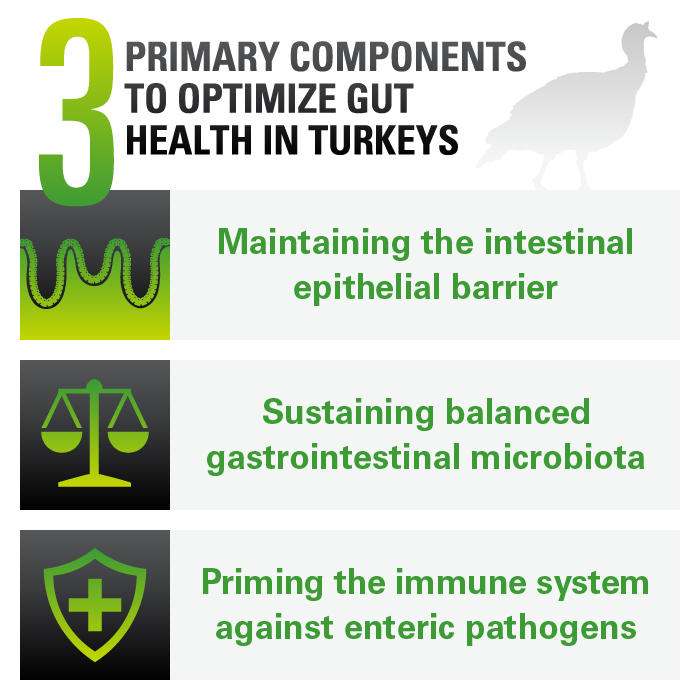2. Maintain Balanced Gastrointestinal Microbiota
Containing up to 100 trillion bacterial cells, the gut microbiota develops within a few days of hatch and influences multiple aspects of intestinal health including epithelial physiology, intestinal immunity and nutrient availability.5,6 Under ideal conditions, the microbial population has a symbiotic relationship with the host. However, stress often leads to changes in the gut microbial population, such as overgrowth of pathogenic bacteria. This dysbiosis of the microbiota is often associated with disease.
Maintaining the balance between the good and the bad intestinal bacteria is clearly important for gut health. One way to positively influence the gut microbiota is to include probiotics – direct-fed microbials – in feed or via the water. Probiotics offer gut health benefits through modes of action such as competitive exclusion of pathogenic bacteria, production of bacteriocins and supporting microbiota homeostatsis.7 Importantly, producers should be sure to choose a probiotic that can survive harsh conditions like acidity of the stomach or the temperatures associated with pelleting.
3. Prime the Immune System Against Enteric Pathogens
The gut-associated lymphoid tissue (GALT) is the largest component of the immune system and serves as the first layer of defense against pathogenic molecules in the intestine.8 Triggering protective immune responses, like inflammation, to address pathogen challenges is an essential function of the GALT; however, here again, balance is key. An insufficient immune response can lead to disease, but an uncontrolled pro-inflammatory response can divert nutrients to support the immune response, thereby limiting nutrient availability for growth.
Enhancing protective immunity early in a bird’s life can have a positive impact not only to help reduce susceptibility to disease but also to support their ability to gain weight faster and convert feed more efficiently. Research suggests that many antibiotic alternative feed ingredients like phytogenics, prebiotics, probiotics and beta glucans may beneficially augment non-specific host immunity.8 For example, the ability of an additive to “prime” the immune system may pay dividends to gut health through a faster immune response trigger to address enteric pathogens.
Keep Gut Health Top of Mind
Poor gut health can lead to reduced feed efficiency, adding up to considerable economic losses for turkey producers. Therefore, producers should strive to protect the three key gut health components – the intestinal barrier, the gut microbiota and the immune system – to ensure these integral systems can work in concert to protect turkeys from disease and enhance their performance potential.
To help turkey producers maximize gut health, good management and husbandry practices, coupled with use of optimal combinations of feed additives is key. Kemin offers a wide range of research-backed and novel gut health solutions designed to support sustainable turkey production. Specifically, the multi-faceted Kemin Gut Health Triple Check program serves as a support system to CLEAN UP contaminants in feed and water prior to animal exposure, BUILD UP intestinal strength and immunity to reduce leaky gut and KNOCK OUT harmful pathogens for healthier and better performing flocks.
For more information about Kemin turkey gut health solutions, visit www.kemin.com/turkey.
References
1Ducatelle, R. et al. 2018. Biomarkers for monitoring intestinal health in poultry: present status and future perspectives. Veterinary Research, 49(43):1-9.
2Ma, X., et al. 2012. Butyrate promotes the recovering of intestinal wound healing through its positive effect on the tight junctions. J. Anim. Sci. 90:266-268.
3Zhang, B., et al. 2012. Zinc prevents Salmonella enterica serovar Typhimurium-induced loss of intestinal mucosal barrier of function in broiler chickens. Avian Pathology. 41:361-367.
4Yu, J. et al. 2020. Tannic acid prevents post-weaning diarrhea by improving intestinal barrier integrity and function in weaned piglets. J. Animal Science and Biotechnology, 11(87):1-11.
5Kogut, M. H. et al. 2017. Gut health in poultry. CAB Reviews, 12(31):1-7.
6Chelakkot, C. et al. 2018. Mechanisms regulating intestinal barrier integrity and its pathological implications. Experimental & Molecular Medicine, 50(103):1-9.
7Kogut, M. H. 2019. The effect of microbiome modulation on the intestinal health of poultry. Animal Feed Science and Technology, 250:32-40.
8Kim, W. H. and Lillehoj, H. S. 2019. Immunity, immunomodulation, and antibiotic alternatives to maximize the genetic potential of poultry for growth and disease response. Animal Feed Science & Technology, 250:41-50.

